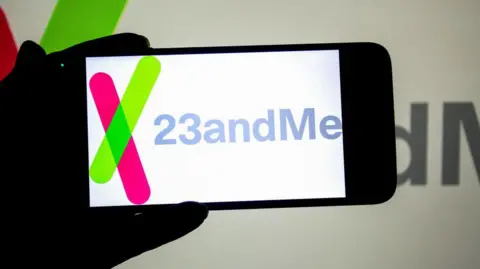In a significant development regarding data security, the UK watchdog, the Information Commissioner’s Office (ICO), has imposed a hefty fine of £2.31 million on the DNA testing company, 23andMe. This penalty stems from a severe data breach that occurred in 2023, affecting a substantial number of individuals and their sensitive personal information. The aftermath of this breach not only resulted in financial penalties but also contributed to the company’s bankruptcy filing earlier this year.
According to the ICO, 23andMe failed to institute adequate protective measures for safeguarding users’ sensitive data before the unfortunate incident took place. Information Commissioner John Edwards characterized the breach as “profoundly damaging,” highlighting the implications of increased exposure of personal information, including sensitive health details and family histories. This failure to protect data remains a concerning aspect in an era where privacy is paramount.
Faced with these challenges, 23andMe is on the brink of acquisition by a new owner, TTAM Research Institute. This new body has voiced commitments to reinforce protections surrounding user data and privacy, seeking to restore consumer faith in the brand following the data breach scandal. The sale reflects efforts to regain control and establish a renewed strategy for data security within the corporation.
The breach itself was instigated by a “credential stuffing” attack, which occurred in October 2023. This type of cyberattack involves utilizing passwords revealed in prior data breaches to gain unauthorized access to accounts where users have reused similar credentials. The attackers succeeded in breaching 14,000 accounts, which subsequently allowed them to download information pertaining to approximately 6.9 million connected unsuspecting individuals on the platform.
Alarmingly, the data accessed through these compromised accounts included personal details of 155,592 residents from the UK, encompassing names, birth years, geographical locations, profile photographs, ethnic backgrounds, health reports, and family trees, although DNA records themselves were reportedly not included in the stolen data. Edwards noted that such personal information, once publicly available, cannot be altered like a password or credit card number, underscoring the irreversible nature of data misappropriation.
Genetic information possesses particular sensitivity, prompting it to be categorized as special data under the UK data protection laws. As such, stricter safeguards are necessary to ensure its protection. The ICO’s ongoing investigation, which initially began in collaboration with Canada’s privacy commissioner in June 2023, revealed that 23andMe had violated UK data protection laws due to a lack of appropriate authentication and verification methods for users during the login process. This included the absence of mandatory multi-factor authentication, a critical security measure that allows users to validate their identity through additional means.
The ICO discovered that 23andMe’s password policies were lax, thereby allowing potential vulnerabilities. Edwards criticized the firm’s delayed response to rectifying these issues, stating that failures within their security framework rendered sensitive user data open to exploitation and harm.
Following the ICO’s investigation, 23andMe has indicated that it resolved the identified issues communicated by both the ICO and the Office of the Privacy Commissioner of Canada by the close of 2024. Despite the current bankruptcy proceedings, both regulatory bodies urged the company to safeguard its users’ sensitive data.
Originally, there was an anticipated sale of 23andMe to biotech giant Regeneron Pharmaceuticals for $256 million. However, the situation evolved when the firm shifted to a deal with TTAM Research Institute driven by Anne Wojcicki, the co-founder and former CEO of 23andMe. The acquisition negotiation has established a new purchase price of $305 million, fortified by assurances to maintain consumer protections, including the option for customers to erase their accounts and genetic data as well as withdraw from research participation. A bankruptcy court is scheduled to review the sale on Wednesday, marking an essential step in what may be a transformative chapter for 23andMe.
The ramifications of this breach extend far beyond financial penalties, calling into question the overarching integrity of data security measures within genetic testing firms. As technology evolves, the need for fortified protocols becomes increasingly critical in preserving consumer trust and protecting personal information against foreseeable threats. The 23andMe case serves as a stark reminder of the responsibilities companies hold in safeguarding sensitive data and the repercussions of failing to do so.



